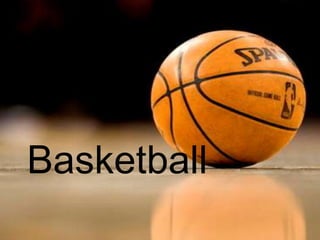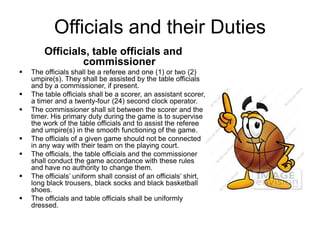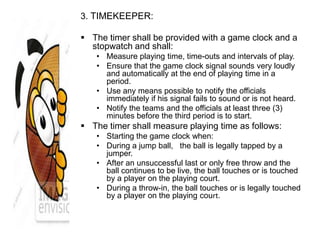Basketball officials
- 1. Basketball
- 2. Officials and their Duties Officials, table officials and commissioner  The officials shall be a referee and one (1) or two (2) umpire(s). They shall be assisted by the table officials and by a commissioner, if present.  The table officials shall be a scorer, an assistant scorer, a timer and a twenty-four (24) second clock operator.  The commissioner shall sit between the scorer and the timer. His primary duty during the game is to supervise the work of the table officials and to assist the referee and umpire(s) in the smooth functioning of the game.  The officials of a given game should not be connected in any way with their team on the playing court.  The officials, the table officials and the commissioner shall conduct the game accordance with these rules and have no authority to change them.  The officials‟ uniform shall consist of an officials‟ shirt, long black trousers, black socks and black basketball shoes.  The officials and table officials shall be uniformly dressed.
- 3. Referee: Duties and powers The referee shall:  Inspect and approve all equipment to be used during the game.  Designate the official game clock, twenty four (24) second clock, and stopwatch and recognize the table officials.  Select a game ball from at least two (2) used balls provided by the home team. Should neither of these balls be suitable as the game ball, he may select the best quality ball available.  Not permit any player to wear objects that may cause injury to others players.  Administer a jump ball to start the first period and an alternating possession throw-in to start all other periods.  Have the power to stop a game when conditions warrant it.  Have the power to determine that a team shall forfeit the game.  Carefully examine the scoresheet at the end of playing time or any time he fee3ls is necessary.  Approve and sign the scoresheet at the end of playing time, terminating the officials‟ administration and connection with the game. The officials‟ power shall begin when they arrive on the playing court twenty (20) minutes before the game is scheduled to begin, and when the game clock signal sounds for the end of the playing time as approved by the officials.
- 4.  Record on the reverse side of the scoresheet, before signing it: • Any forfeit or disqualifying foul, • Any unsportsmanlike behavior by players, coaches, assistant coaches or team followers that occurs prior to the twenty (20) minutes before the game is scheduled to begin, or between the end of playing time and the approval and signing of the scoresheet.  In such a case, the referee (commissioner, if present) must send a detailed report to the organizing body of the competition.  Make the final decision whenever necessary or when the officials disagree. To make final decision he may consult the umpire(s), the commissioner, if present, and/or the table officials.  Be authorized to approve and use the technical equipment, if available, to decide, before he signs the scoresheet, if a last shot for a field goal at the end of each period or each extra period was released during playing time and/or whether that shot for a field goal counts for two (2) or three (3) points.  Have the power to make decisions on any point not specifically covered by these rules.
- 5. Officials: Duties and powers  The officials shall have the power to make decisions or infractions of the rules committed either within or outside the boundary line including the scorer‟s table, the team benches and the areas immediately behind the lines.  The officials shall blow their whistles when an infraction of the rules occurs, a period ends or the officials find it necessary to stop the game. The officials shall not blow their whistles after a successful field goal, a successful free throw or when the ball becomes live.  When deciding on a personal contact or violation, the officials shall, in each instance, have regard to and weigh the following fundamental principles: • The spirit and intent of the rules and the need to uphold the integrity of the game. • Consistency in application of the concept of „advantage/disadvantage‟. The officials should not seek to interrupt the flow of the game if necessarily in order to penalize incidental personal contact which does not give the player responsible an advantage nor place his opponent at a disadvantage. • Consistency in the application of common sense to each game, bearing in mind the abilities of the players concerned and their attitude and conduct during the game. • Consistency in the maintenance of a balance between game control and game flow, having a „feeling‟ for what the participants are trying to do and calling what is right for the game.
- 6. • Should a protest be filed by one of the teams, the referee (commissioner, if present) shall, within one (1) hour following the end of playing time, report the protest to the organizing body of the competition. • If an official is injured or for any other reason cannot continue to perform his duties within five (5) minutes of the incident, the game shall be resumed. The remaining official(s) will officiate alone until the end of the game, unless there is possibility of replacing the injured official with a qualified substitute official.After consulting with the commissioner, if present, the other official will decide upon the possible replacement. • For all international games, if verbal communication is necessary to make a decision clear, it shall be conducted in English language. • Each official has the power to make decisions within the limits of his duties, but has no authority to disregard or question decisions made by the order official(s). • Decisions made by the officials are final and cannot be contested or disregarded.
- 7. 2. OFFICIAL SCOREKEEPER AND ASSISTANT SCORER • The scorer shall be provided with a scoresheet and shall keep a record of: – Teams, by entering the names and numbers of the players who are to start the game and all of substitutes who enter the game. When there is an infraction of the rules regarding the five (5) players to start the game, substitutions or numbers of players, he shall notify the nearest official as soon as possible. – Running summary of points scored, by entering the field goals and the free throws made. – Fouls charged against each player. The scorer must notify an official immediately when five (5) fouls are charged against any player. He shall record the fouls charged against each coach and must notify an official immediately when a coach should be disqualified. Similarly, he must notify an official immediately when a player has committed two (2) unsportsmanlike fouls and should be disqualified. – Time-outs. He must notify the officials of the time-outs opportunity when a team has requested a time-out and notify the coach through an official when the coach has no more time- out (s) left in a half or extra period. – The next alternating possession, by operating the alternating possession arrow. The scorer shall reverse the direction of the alternating possession arrow immediately after the end of the first half as the teams shall exchange baskets for the second half.
- 8.  The scorer shall also: • Indicate the number of fouls committed by each player by raising, in a manner visible to both coaches, the marker with the number of fouls committed by that player. • Position the team foul maker on the scorer‟s table, at the end nearest to the bench of the team in a team foul penalty situation, when the ball becomes live following the fourth teams foul in a period. • Effect substitutions. • Sound his signal only when the ball becomes dead and before the ball becomes live again. The sound of his signal does not stop the game clock or the game nor cause the ball to become dead.  The assistant scorer shall operate the scoreboard and assist the scorer. In the case of any discrepancy between the scoreboard and the scoresheet which cannot be resolved, the scoresheet shall take precedence and the scoreboard shall be corrected accordingly.  If a scorekeeping error is recognized: • During the game, the scorer must wait for the first dead ball before sounding his signal. • After the end of the playing time and before the scoresheet has been signed by the referee, the error shall be corrected, even if this correction influences the final result of the game. • After the scoresheet has been signed by the referee, the error may no longer be corrected. The referee or the commissioner, if present, must send a detailed report to the organizing body of the competition.
- 9. 3. TIMEKEEPER:  The timer shall be provided with a game clock and a stopwatch and shall: • Measure playing time, time-outs and intervals of play. • Ensure that the game clock signal sounds very loudly and automatically at the end of playing time in a period. • Use any means possible to notify the officials immediately if his signal fails to sound or is not heard. • Notify the teams and the officials at least three (3) minutes before the third period is to start.  The timer shall measure playing time as follows: • Starting the game clock when: • During a jump ball, the ball is legally tapped by a jumper. • After an unsuccessful last or only free throw and the ball continues to be live, the ball touches or is touched by a player on the playing court. • During a throw-in, the ball touches or is legally touched by a player on the playing court.
- 10.  Stopping the game clock when:  Time expires at the end of playing time for a period, if not stopped automatically by the game clock itself.  An official blows his whistle while the ball is live.  A field goal is scored against a team which has requested a time-out.  A field goal is scored in the last two (2) minutes of the fourth period and in the last two (2) minutes of each extra period.  The twenty-four (24) second clock signal sounds while a team is in control of the ball.  The timer shall measure a time-out as follows: • Starting the stopwatch immediately when the official blows his whistle and gives the time-out signal. • Sounding his signal when fifty (50) seconds of the time-out have elapsed. • Sounding his signal when the time-out has ended.
- 11.  The timer shall measure an interval of play as follows: • Starting the stopwatch immediately when a previous period has ended. • Sounding his signal before the first and third period when three (3) minutes, one(1) minute and thirty (30) seconds remain until the beginning of the period. • Sounding his signal before the second, fourth and each extra period when thirty (30) seconds remain until the beginning of the period. • Sounding his signal and simultaneously stopping the stopwatch immediately when an interval of play has ended.  Twenty-four(24) second operator: Duties  The twenty-four (24) second clock operator shall be provided with a twenty-four (24) second clock which shall be:  Started or restarted when: • A team gains control of a live ball on the playing court. • On a throw-in, the ball touches or is legally touched by any player on the playing court.
- 12. 4. COACH  At least 20 minutes before the game is scheduled to begin, each coach or his representative shall give the scorer a written list of the names and numbers of the team members who are to play in the game, as well as the names of the captain of the team, the coach and the assistant coach.  At least 10 minutes before the game, both coaches shall confirm their agreement with the names and numbers of their team members and the names of the coaches inscribed by signing the score sheet. At the same time they shall indicate the five players who are to start the game. The “A” will be the first to provide this information.  Only the coach or the assistant coach may makes the request for changed time-out.  When a coach or assistant coach requires a substitution to be effected, the substitute must report to the scorer to make the request and must be ready to play immediately.
- 13.  If there is an assistant coach his name must be inscribed on the score sheet before the beginning of the game (his signature is not necessary). He shall assume the responsibilities of the coach if for any reason, the coach is unable to continue.  The team captain, shall act as coach if there is no coach or if the coach is unable to continue and there is no assistant coach inscribed on the score sheet (or the later is unable to continue). If the captain must leave the playing court for any valid reason, he may continue to act as coach. However, if he must leave following a disqualifying foul, or if he is unable to act as coach because of injury, his substitute as captain shall replace him as coach.  Only the coach, whose name is inscribed on the score sheet, is permitted to remain standing during the game. This also applies to any individual who replaces the coach for any reason.
- 14. 5. CAPTAIN  When necessary, captain shall represent his team on the court.  He may address an official to obtain essential information. But this should be done in a courteous manner and only when the ball is dead and the clock is stopped.  When the captain leaves the playing court or any valid reasons, the coach shall inform an official o the number of player who will replace him as captain on the court during his absence.  The captain may act as coach.  The captain shall designate the jumper of his team in a jump ball situation and the free-throw shooter determined by the rules.
- 15. 6. GUARDS AND FORWARDS: should possess the following: 1. FORWARDS: 1. ability to shoot consistently from different positions 2. ability to rebound 3. ability to vary style and speed 4. ability to plan and execute plays 5. ability to remain calm under pressure 2. GUARDS 1. ability to feel out strength and weaknesses of opponents and to analyze pattern of movements 2. ability to stay with the players and to anticipate possible plays 3. ability to steal or tie the ball without fouling 4. ability to rebound and pass accurately 5. ability to shift pattern of defensive play














